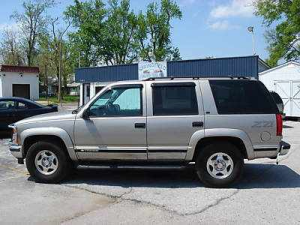The full-size SUV has been around since the middle of the 20th century (or even longer, depending on how loosely you define the term). However, it was a niche product until about 20 years ago, when it became one of the primary ways in which Americans move their families and friends around. Screw minivans and station wagons—Mom needs a 5,000-lb., body-on-frame, V8-equipped, (often) four-wheel-drive truck in which to fetch Junior from bassoon practice, or pick up some eggs and Heinz 57.
And Washington, DC had a lot to do with it.
The Corporate Average Fuel Economy (CAFE) regulations, first enacted by Congress in 1975, establish required fleet average fuel economies for automobile manufacturers. A carmaker’s fleet must meet the number in effect for the year, or pay fines. There are different (less stringent) scales for light trucks, and some heavy-duty (but still marketed and sold to the public at large) trucks have been, and are, exempt (anything 8,500+ lbs.).
So it was just about 20 years ago that smaller light trucks began spawning SUVs that were marginally refined enough to serve as station wagons (think Cherokees and Explorers). The CAFE numbers were fairly flat year over year, but there were other things, like increased federal safety regulations, taking large bites from small car profitability.
 And then some room full of smart people at General Motors thought something like “hmmmm. We could take a Silverado pickup and turn it into a regular family SUV as well. We’re already selling the Suburban to Brady Bunches with boats and ranchers, but what about one click smaller? Think anyone would buy that? Let’s give it a shot.”
And then some room full of smart people at General Motors thought something like “hmmmm. We could take a Silverado pickup and turn it into a regular family SUV as well. We’re already selling the Suburban to Brady Bunches with boats and ranchers, but what about one click smaller? Think anyone would buy that? Let’s give it a shot.”
And gee whiz, it worked! If you can make an SUV from a pickup for, say, $8,000, but then charge a $20,000 markup, then well, you’re going to do that, yes? Hello, Chevy Tahoe/Cadillac Escalade. Hello, Ford Expedition/Lincoln Navigator.
So now you’ve got vehicles with abysmal fuel economy dragging down the light truck CAFE average. Ah, but there are gigantic profits—more than enough to offset those effects and consequent fines. The profits are even gigantic enough to offset having to sell small cars at a loss. Have to have those small cars to keep the fleet MPG average up, and so what if we’re taking a hit of a grand or so on each one? Look what we’re making on the behemoths!
How about a $60,000 Hummer H2 (when they were around)? It didn’t count at all! It was over the weight limit by 100 lbs. or so. GM didn’t even have to publish MPG figures for it.
An automaker was financially motivated by federal regulation to make a passenger vehicle weigh more than 8,500 lbs. And guess what? There was a Chevy Tahoe hiding in a Hummer H2, as well.
This thinking might have delayed GM’s bankruptcy a decade. Most certainly, it was a heavy contributor to America’s appetite for light trucks (in this application, anyway). Don’t blame GM, either. A corporation has a responsibility to find its best path through the law. (Same thinking applies to things like General Electric’s much-tsk-tsked zero income tax for 2010. That’s the fault of the tax code, not GE.)
There is a lot to be said here about government’s proper role in our lives, but in this case, you don’t even have to go that far. There is no need to assume malice when incompetence is a plausible explanation. Intervening in a complex system almost always creates unanticipated outcomes, and often they are negative. The suburban housewife at the wheel of a body-on-frame 4×4 is an excellent poster child for unintended consequences.
You can believe the U.S. government is totally benevolent toward its citizens, always acting in their best interests. You can believe that your faith in it is well-placed, because Our Betters are looking out for us.
But have you ever considered that there are some things it can’t, and therefore shouldn’t, do?
You might also like:
- I drive a clown car because…
Gasoline hit $4.499 a gallon in late spring 2008, and when it did Lea and I started talking about a … - Back to Monster Jam
The boys and I went back to Monster Jam this year. This time Rocket City Mom took care of our admiss… - Monster trucks: fabulously ridiculous
Behold, the professional wrestling of motorsports! (Or maybe it’s the figure skating of motorsports?… - Save time at the drive-through ATM by being judgmental
So you pull up to the drive-through ATM. There are two lines, each with an identical number of vehic… - Please don’t worry about the mobile, autonomous gunship that eats people
Hey, how about a steam-powered robot that eats organic material for fuel? You know—plants? Old furni…